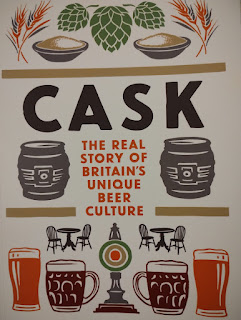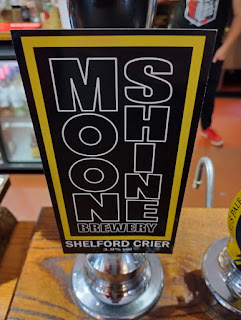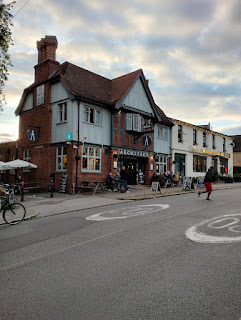So it was with an inquisitorial eye that I read the book. It covers a lot of ground, including many things I've researched myself so it's good to see it gathered together in a publication. It starts with details of how beer is made, packaged and dispensed. The latter surprisingly has autovacs, where beer from the drip tray is recycled, getting a positive write up! I have a morbid fascination with myself but really they are just minging.
Cask is then compared to other lesser packaging and dispense formats before moving on to beer tasting and beer styles. This drifts away from cask beer and goes into foreign territory, discussing amongst others things Czech and German lagers, but strangely not mentioning their unfiltered and naturally carbonated forms, which surely is the closest cask equivalents.
Food pairing follows, though once again crisps are overlooked, before going back to the prehistory of beer and working back forward to the present day. There's a lot on a subject dear to my heart, Brettanomyces and secondary fermentations, though I don't agree with some of the conclusions reached: that original IPAs weren't real ale and cask beer is a relatively modern invention.
Cask is a large and comprehensive book about beer but despite it's subtitle it is not the real story of Britain's unique beer culture. There is hardly any mention of pubs at all and culture only really comes up in terms of yeast cultures! It's more a big book about beer and cask's place within it. Technically it is generally sound, the main problems were as I'd feared of a spiritual nature.
As a man of simple faith I have had trouble adjusting to the ecumenical times we live in. I understand we should try and avoid offending heathens by denigrating the emissions of the devil's drainpipe, but our Mother Church still rightly teaches that cask beer is the pinnacle of the brewers art. So when Des wrote "Cask beer was already Britain's lager" I did think fuck off, bollocks, you're a cunt this is a poor analogy and out of step with with the detailed research present on other matters.
We're also told that the problem with keg beer when CAMRA was formed was not that it was keg, but that it was bad keg. This is making the common mistake that the opposite of good beer is bad beer. Those of us with that follow the one true faith know that the opposite of good beer is in fact evil beer*. And later we see just how evil as Des confesses that "it's undoubtedly true that craft keg has abstracted volumes from cask". Even a godless heathen will realise that this is bad news for cask beer so I would have expected to see more concern about it in a book called Cask. The promiscuity of "repertoire drinking", where people are not faithful to one drink type, may no longer be anathematized but every pint of keg drunk is a pint of cask not sold.
Inevitably the reactionary position that cask beer should be more expensive is promoted, though to be fair opposing voices are heard. In the final section the author seems intensely relaxed about cask beer becoming a niche product but I can't help but wonder how much poorer the world of beer would be if our church's founding fathers had felt the same. Fortunately they founded a church militant, a campaigning organisation, and we must not tire in our constant struggle to promote beer served as god intended.
The book contains a lot of good information but its theological shortcomings mean it can't be recommended to the general public and should only read by CAMRA members in good standing.
* Yes I did gratuitously write that blog post purely so that if I ever got round to writing this review I could link to it.










